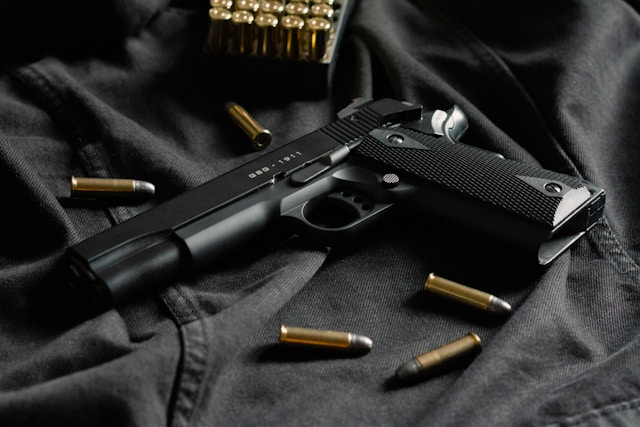Key Takeaways:
- Familiarity with local concealed carry laws lays the groundwork for lawful and responsible firearm carrying.
- A formal process and training reinforce the significance of skill and knowledge in concealed carry practices.
- Knowledge of reciprocity, self-defense laws, and safe handling practices are critical for avoiding legal pitfalls.
- Continuous learning and mental preparedness empower individuals to handle the severe responsibility of concealed carry.
- Staying abreast of legislative changes ensures compliance and advocacy for responsible gun ownership rights.
Table of Contents:
- Understanding Concealed Carry Laws
- The Concealed Carry Permit Process
- Concealed Carry Reciprocity Explained
- Firearms Training for Concealed Carry
- Situational Awareness and Conflict Avoidance
- The Legal Repercussions of Using a Gun for Self-Defense
- Safe Storage and Transportation of Concealed Carry Firearms
- Discussing Concealed Carry With Family and Friends
- The Role of Mental Preparedness in Concealed Carry
- The Future of Concealed Carry Legislation
Understanding Concealed Carry Laws
Concealed carry laws are as varied as the states, with each jurisdiction setting criteria for lawfully concealed firearm carrying. These statutes typically define what constitutes concealed carry, identify designated public areas where carrying is prohibited, and elucidate the legal implications of non-compliance. It is essential for gun owners navigating these regulatory waters to have a solid understanding of these laws to exercise their rights responsibly and avoid unintentional violations.
The Concealed Carry Permit Process
Securing the privilege to carry a concealed weapon commences with completing a licensed training program. Such programs delve into firearm operation, safety protocols, and relevant legal knowledge. The ensuing steps often entail completing an application, submitting criminal history checks, and providing fingerprint identification. The meticulous nature of this process demonstrates the critical emphasis placed on safety and responsibility in the concealed carry community. Furthermore, watch for the weapon’s periodic need to replace essential parts. Purchasing small parts—like sig sauer factory parts for sale—online is simple and quick. To locate higher or lower components, naturally, navigate through multiple levels. It guarantees that you carry a secure weapon.
Concealed Carry Reciprocity Explained
The concept of reciprocity in concealed carry pertains to recognizing one state’s permit by another, allowing permit holders to carry concealed firearms across state lines legally. While some states unilaterally acknowledge out-of-state licenses, others require formal, reciprocal agreements or refuse recognition altogether. For gun owners who travel, understanding these interstate variances is essential for continuous compliance and avoiding legal misunderstandings.
Firearms Training for Concealed Carry
Competent handling of firearms is not innate but developed through rigorous training and practice. In many jurisdictions, a grant of a concealed carry permit is contingent upon completing a government-recognized firearms training course. The content of such courses extends beyond basic gun mechanics to strategic considerations, like scenario-based drills and legal aspects of firearm use. Fulfilling such training requirements underscores the bearer’s commitment to safe and knowledgeable firearm handling.
Situational Awareness and Conflict Avoidance
Mastery of situational awareness translates to a heightened perception of one’s environment, enabling early identification of potential threats and the avoidance of hazardous confrontations. This proactive stance signals a deep-seated prioritization of safety and exemplifies mature judgment. Practicing de-escalation techniques complements this defensive strategy, positioning the individual as a cautious and prudent firearm carrier.
The Legal Repercussions of Using a Gun for Self-Defense
When misfortune necessitates firearm use in self-defense, the legal system scrutinizes the incident against stringent criteria to assess the justification of force applied. Gun owners must be conversant with the laws governing such use to ensure that any defensive actions taken lie within the legal bounds of their respective states. Grasping these distinctions is a deterrent against overstepping legal boundaries and a guide for making split-second decisions in dire circumstances.
Safe Storage and Transportation of Concealed Carry Firearms
It is crucial to keep guns locked up when commuting or at home to avoid unwanted access and accidents. The diversity in storage and transportation regulations among states mandates that gun owners remain vigilant and current with these provisions. Employing best practices such as using safes and lockboxes and familiarizing oneself with the transportation regulations reflects an unwavering commitment to safety and compliance.
Discussing Concealed Carry With Family and Friends
Facilitating dialogue about concealed carry with one’s social circle can demystify firearm ownership and reinforce a shared commitment to safety. Conversations injected with empirical evidence and devoid of polarizing rhetoric foster a supportive environment for all involved. Educating friends and family about concealed carry’s intricacies and legal obligations is a conduit for raising community awareness about responsible gun ownership.
The Role of Mental Preparedness in Concealed Carry
Donning the mantle of concealed carry comes with a demanding psychological responsibility. This invisible load involves mental readiness for possible life-altering scenarios, coping with the stress of potential altercations, and maintaining decision-making clarity under duress. Regular mental conditioning and stress inoculation drills can enhance a gun owner’s psychological resilience, equipping them to manage the heavy responsibility conferred by the concealed carry license.
The Future of Concealed Carry Legislation
Legislative landscapes are inherently dynamic, and firearms laws are no exception. Vigilance in monitoring legislative trends and active participation in discourse shapes the evolution of gun laws. At the same time, adherence to the current regulations preserves one’s standing within the law-abiding gun community. Staying connected to the pulse of policy change ensures preparedness for upcoming modifications to concealed carry protocols.

